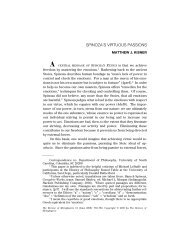heidegger's being and time and national socialism - Philosophy ...
heidegger's being and time and national socialism - Philosophy ...
heidegger's being and time and national socialism - Philosophy ...
Create successful ePaper yourself
Turn your PDF publications into a flip-book with our unique Google optimized e-Paper software.
ward the community <strong>and</strong> its members. In addition,<br />
the equality proclaimed by Enlightenment,<br />
liberalism, <strong>and</strong> leftism ignored the essential features<br />
of human life, namely, hierarchy <strong>and</strong> authority.<br />
In the view of rightists, society destroyed<br />
community, <strong>and</strong> social democracy <strong>and</strong> communism<br />
were merely intensifications of the egotism<br />
<strong>and</strong> ungodliness of liberalism, a downward<br />
plunge that would end in chaos <strong>and</strong> anarchy. Fortunately<br />
enough, however, at a <strong>time</strong> when it was<br />
not yet too late—for instance, with the beginning<br />
of World War I—destiny would interfere <strong>and</strong> call<br />
upon the humans to destroy society <strong>and</strong> revitalize<br />
community. 6 Thus, in terms of temporality, for<br />
liberals <strong>and</strong> leftists the future was the dominant<br />
dimension of <strong>time</strong>, the future state of society<br />
toward which history moved. By contrast, for<br />
rightists the dominant dimension was the past,<br />
which liberals <strong>and</strong> leftists denigrated, denied,<br />
<strong>and</strong> destroyed but which would be revitalized.<br />
Conservative or nostalgic rightists wanted to<br />
re-realize the community the way it had been<br />
(e.g., without electricity, etc.) before it had been<br />
pushed aside by society, while revolutionary<br />
rightists claimed that the re-realized community<br />
should incorporate phenomena which, temporally,<br />
had emerged along with society without <strong>being</strong>,<br />
in the view of these rightists, essentially societal;<br />
in the first place modern technology <strong>and</strong><br />
capitalism as a mode of production based on private<br />
ownership of the means of production on a<br />
large scale <strong>and</strong> the accumulation of private profits.<br />
Capitalism meant for them only parliamentary<br />
democracy, unions, <strong>and</strong> the societal mentality<br />
of many members of society, in particular the<br />
workers. Once these phenomena were annihilated,<br />
it would become obvious that the capitalist<br />
mode of production was necessary for the flourishing<br />
of the revitalized community. The second<br />
problem for rightists was which community<br />
should be revitalized. The first Kaiserreich, the<br />
second Kaiserreich, the Vikings, etc.? Many<br />
rightist intellectuals had developed theories of<br />
community <strong>and</strong> its different types. Max Scheler,<br />
for instance, in his famous book Formalism in<br />
Ethics <strong>and</strong> Non-Formal Ethics of Values from<br />
1916 <strong>and</strong> other writings, distinguished between<br />
small communities (family, village, etc.) <strong>and</strong><br />
PHILOSOPHY TODAY<br />
256<br />
large communities. Large communities are ordered<br />
in a hierarchy within which each lower<br />
community has to serve the ones above it.<br />
Scheler gave four criteria for large communities.<br />
According to each of them, the love-community<br />
of the Catholic Church st<strong>and</strong>s at the top of the hierarchy<br />
of large communities. It is concerned<br />
with the highest values, encompasses the most<br />
humans, is a collective person, <strong>and</strong> acknowledges<br />
each individual member of the community<br />
also as a person, a <strong>being</strong> in her own right, independent<br />
of her contribution to the well<strong>being</strong> of<br />
the community. The Catholic Church is followed<br />
by the cultural community (e.g., Western Europe)<br />
<strong>and</strong> the state. The lowest community is the<br />
community of the people (Volksgemeinschaft),<br />
which deals with the lowest values relevant to<br />
communities <strong>and</strong> assesses individuals exclusively<br />
in terms of their functional contribution to<br />
the welfare of the community. 7 Thus the revolutionary<br />
rightist Scheler (who saw in Thomas<br />
Aquinas the first signs of the ethos of society)<br />
fought for the re-realization of the Catholic lovecommunity<br />
while the revolutionary rightist Hitler<br />
fought for the re-realization of the community<br />
of the people. Since Scheler had sufficient conceptual<br />
means to distinguish his theory from Hitler’s,<br />
<strong>and</strong> since he realized that Hitler would take<br />
over the entire right, in the last years of his life<br />
before his death in 1928, he turned not only<br />
against Hitler but against the entire right, became<br />
a liberal <strong>and</strong> social democrat <strong>and</strong> defended the<br />
Weimar Republic against its foes. 8<br />
The political front-lines in Germany at the<br />
<strong>time</strong> were clear. There were no disagreements<br />
about the meaning of the different political positions<br />
that I have outlined <strong>and</strong> (leaving aside polemics)<br />
everyone interpreted his own position<br />
<strong>and</strong> the ones of the others in the same way as everyone<br />
else did. In Historical Destiny <strong>and</strong> National<br />
Socialism in Heidegger’s Being <strong>and</strong> Time,<br />
I presented as examples of revolutionary rightists<br />
Hitler 9 <strong>and</strong> Scheler 10 <strong>and</strong> as an example of a communist<br />
Georg Lukács. 11 As to liberals <strong>and</strong> social<br />
democrats, I referred to the (identical) characterizations<br />
of these two positions in Hitler, Scheler,<br />
Lukács, Paul Tillich, <strong>and</strong> others <strong>and</strong> adduced, as<br />
already mentioned, the late Scheler as an exam-
















